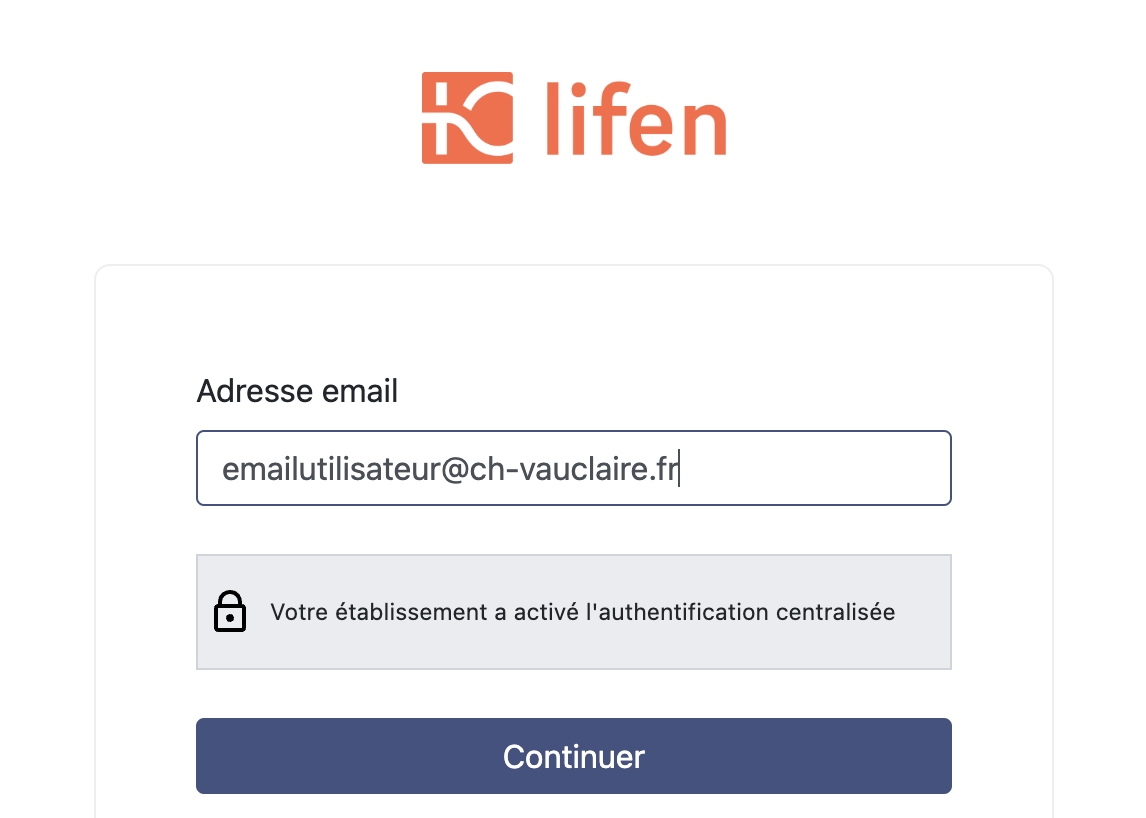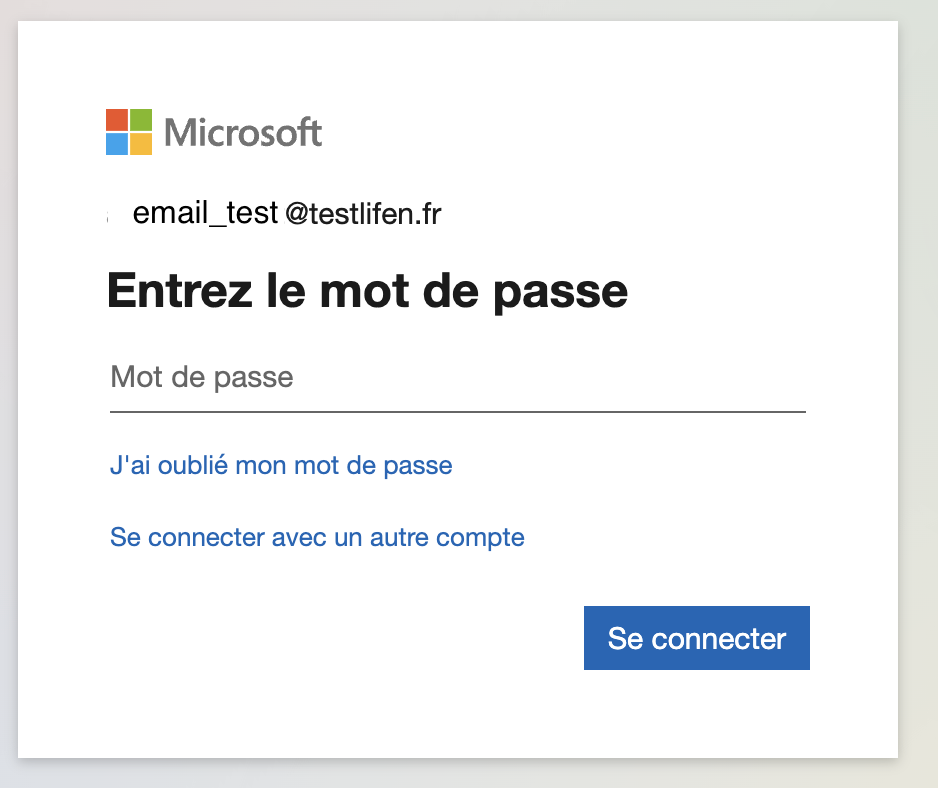SSO API Service
Introduction
The Single Sign-On (SSO) API Service enables you to let your users connect to your application using their hospital credentials.
Access Control
The Lifen Platform Solution Architects provide you with :
- specific identifiers (
client_id,client_secret) to consume the SSO API. They are different from the identifiers used to retrive a machine-to-machine token for other Lifen APIs. - identifiers pointing to each IdentityProvider * with which the app is connected (cf
acr_values)
*An IdentityProvider is the AzureAD (or other provider) of the hospital. For example, the AzureAD of the Nîmes CHU.
You don't need a Machine To Machine Communications to use this API.
SSO Workflow
The standard Oauth2 / OIDC protocol must be executed with the following steps.
We provide an OIDC discovery mechanism: https://api.lifen.fr/sso/v1/.well-known/openid-configuration.
We support the PKCE extension.
Step 1
Call the following url with adequate parameters :
GET api.lifen.fr/sso/v1/authorizeSince the Lifen SSO API Service respects the Oauth2 / OIDC protocol, we highly recommend to call it via an appropriate library which will help to abstract the procotol details. You will need to setup the library with the following parameters :
| Parameter | Value type | Description & Restrictions |
|---|---|---|
client_id | string | $your_client_id |
client_secret | string | $your_client_secret |
response_type | string | code |
scope | string | openid email profile |
redirect_uri | string | _Callback location where the user agent is directed to along _with the code. |
state | string | Opaque value to maintain state between request and callback. |
acr_values | string | The IdP identifier, required so that we know on which IdP we should redirect the authentication request. Possible values are provided by the LifenPlatform. |
login_hint | string | The user identifier. It will be used to prefill the identifier at the login step. |
You decide when you want to trigger a user authentication via the Lifen SSO API.For example, in the Lifen Sending application, we have chosen to implement the Lifen SSO API Service in the following way : when a user fills an email linked to a hospital's SSO, we enforce a call to the Lifen SSO API.

Step 2
The user must authenticate directly via the hospital's identity provider. For example :

When the user session is still active, the user skips the credentials stepIf the user session is still active (the session of the hospital), the user doesn't need to fill in his password, he is directly redirected and connected to the application (via the Lifen SSO API).
Step 3
We direct you towards the redirect_uriof your application with a code (Authorization Code Flow).
Step 4
You use the code in exchange for tokens.
curl --request POST \
--url api.lifen.fr/sso/v1/token \
--data 'grant_type=authorization_code&redirect_uri=$redirect_uri&code=$codeStep 5
You use the id_token to define the session of the user. It is also possible to get the user information via the standard userinfo endpoint.
Example
Let's take the example of a Ruby/Rails app that would call the Lifen SSO API via a standard library (e.g. OmniAuth::OpenIDConnect).
# The configuration is centralised in the Omniauth gem and it helps abstract the protocol # :
provider :openid_connect, {
name: :platform_sso,
setup: lambda { |env|
request = ActionDispatch::Request.new(env)
env['omniauth.strategy'].options.merge!({
issuer: config['issuer'],
discovery: true, # (optional) OIDC standard: urls do no have to be specified manually, they can be "discovered" on a public endpoint.
scope: [:openid, :email, :profile], # These are the defaults scopes. Custom claims (such as AzureAd groups) have to be discussed.
response_type: :code, # Authorization Code Flow is standard (and is the only flow we support).
pkce: true,
state: # some_sate
client_options: {
identifier: $your_client_id, # client_id, provided by Lifen
secret: $your_client_secret, # client_secret, provided by Lifen
redirect_uri: config['redirect_uri'], # Decided by the application, shared with Lifen - that's were the user will be redirected once authenticated, with the "code"
},
})
end
},
}
///
# The "login" view triggers the call to the library and passes the following parameters #
<%= link_to "Login with Chu-Nîmes SSO", "/auth/platform_sso?login_hint=#{user_email}&acr_values=chu-nimes", method: :post,
# login_hint and acr_values are mandatory parameters.
///
# All the protocol is handled under the hood by the library ; you retrieve all the info linked to the user after the authentication on the callback url :
class SessionsController < ApplicationController
def create
user_info = request.env['omniauth.auth']
# Here, the app can access to the user data (or IdP session)...
# {
# nbf: 1664881690,
# aio: "ATQAy/8TAAAAHSB7GNJ/Bj6Ed9BZbCsKUuJi2ettytPVc2nqQZXyDmUzIeOuLCTOqV6EPXyVWe54",
# family_name: "Martin",
# given_name: "Jean",
# groups: "["85b8c33a-412b-45ad-81fd-863335c148bf","53e64ca3-8db0-4a13-9524-59854c77b453","5d92306e-459a-4f05-972c-352612003307","8c4734d2-9010-4963-b230-fc59a5187b16"]",
# ipaddr: "89.207.171.76",
# name: "Jean Martin",
# oid: "a1b819fe-4372-40b8-85b2-97449d85d5f9",
# rh: "0.AYEABugMQPag4E24Yk6rdBRdCUn7bAS9yiRMsW1gOyF11h6BANA.",
# sub: "d64iPNqQBYObpISUkcnB4iP6Dkkb3DfytSz1VhqHg1o",
# tid: "400ce806-a0f6-4de0-b862-4eab74145d09",
# unique_name: "[email protected]",
# upn: "[email protected]",
# And create its local session:
@user = User.find_or_create_by(sso_id: user_info[:email]
# etc.
endLog out
When a user logs out of your application, this ends the user's SSO session at the Lifen API level, not on the hospital's SSO level (AzureAD…).
For a user to log out, please use :
GET https://api.lifen.fr/sso/v1/session/logoutwith the following parameters :
| Parameter | Value type | Description |
|---|---|---|
id_token_hint | string | The ID token to use to identify which SSO session to terminate. |
state | string | The state will be returned in the final redirect. |
post_logout_redirect_uri | string | The URL that the user is redirected at the end of logout from Curity. |
client_id | string | The client id of the requestor. |
Error management
Whenever you encounter an error, please check that the acr_values parameter is correctly filled and valid.
| Status code | Type | Definition |
|---|---|---|
| 400 | Bad Request | It is likely that one of your parameters client_id or redirect_uri is invalid. Otherwise, please reach out to [email protected]. with the Error identifier that appears on the error page. |
| 401 | Unauthorized | It is likely that your client_secret is invalid. |
Testing environment
You can test our SSO API on our post-prod environment : api.post-prod.lifen.fr/sso/v1…
In order to test the workflow from end to end (and trigger a user authentication) you need to provide us with your internal test AzureAD.
Updated 8 months ago
